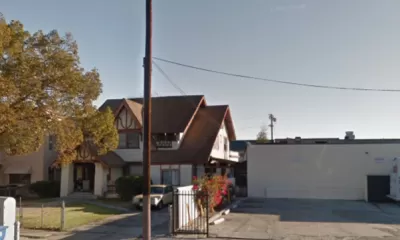California’s density bonus law lets developers skirt some zoning regulations to build multifamily housing.

A Los Angeles developer is frustrating residents by identifying single-family lots where the law allows for building multi-family housing, buying up the properties, and redeveloping them into apartment buildings, reports Liam Dillon in the Los Angeles Times. Housing advocates might hail this as a win for affordable housing, while preservationists and neighborhood groups argue Akhilesh Jha’s relentless pursuit of new projects is destroying historic neighborhoods and using legal loopholes for personal profit.
“While Jha’s ideas are far out of scale with nearby properties, he’s also not plopping the buildings in the middle of subdivisions. The projects are all within about half a mile of a major freeway with other multifamily housing and businesses nearby,” Dillon adds. Jha has won approval for his projects largely because the law, in many cases, favors housing production.
Jha uses California’s density bonus law, which “allows developers to build more dense housing on a lot in exchange for dedicating some of the units for low-income families,” to bypass many zoning codes and building regulations such as height limits and parking requirements. Jha also filed an application using the ‘builder’s remedy’ in the brief weeks when Los Angeles was eligible for such projects.
With only 10 percent or less of the units slated for low-income households, critics argue that Jha is disingenuously using “the most aggressive interpretation of state regulations” to build outsized projects that will strain local resources and bring down property values.
FULL STORY: This L.A. developer aims to tear down homes to build apartments where the city doesn’t want them

Maui's Vacation Rental Debate Turns Ugly
Verbal attacks, misinformation campaigns and fistfights plague a high-stakes debate to convert thousands of vacation rentals into long-term housing.

Planetizen Federal Action Tracker
A weekly monitor of how Trump’s orders and actions are impacting planners and planning in America.

Chicago’s Ghost Rails
Just beneath the surface of the modern city lie the remnants of its expansive early 20th-century streetcar system.

Bend, Oregon Zoning Reforms Prioritize Small-Scale Housing
The city altered its zoning code to allow multi-family housing and eliminated parking mandates citywide.

Amtrak Cutting Jobs, Funding to High-Speed Rail
The agency plans to cut 10 percent of its workforce and has confirmed it will not fund new high-speed rail projects.

LA Denies Basic Services to Unhoused Residents
The city has repeatedly failed to respond to requests for trash pickup at encampment sites, and eliminated a program that provided mobile showers and toilets.
Urban Design for Planners 1: Software Tools
This six-course series explores essential urban design concepts using open source software and equips planners with the tools they need to participate fully in the urban design process.
Planning for Universal Design
Learn the tools for implementing Universal Design in planning regulations.
planning NEXT
Appalachian Highlands Housing Partners
Mpact (founded as Rail~Volution)
City of Camden Redevelopment Agency
City of Astoria
City of Portland
City of Laramie





























